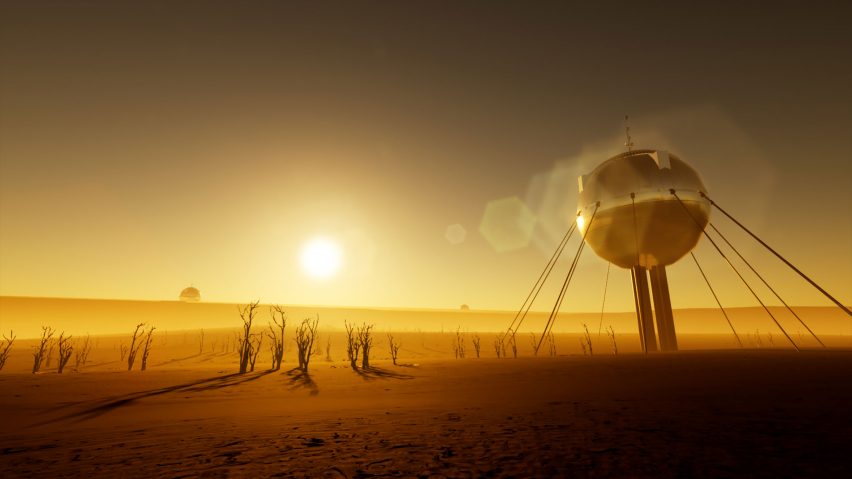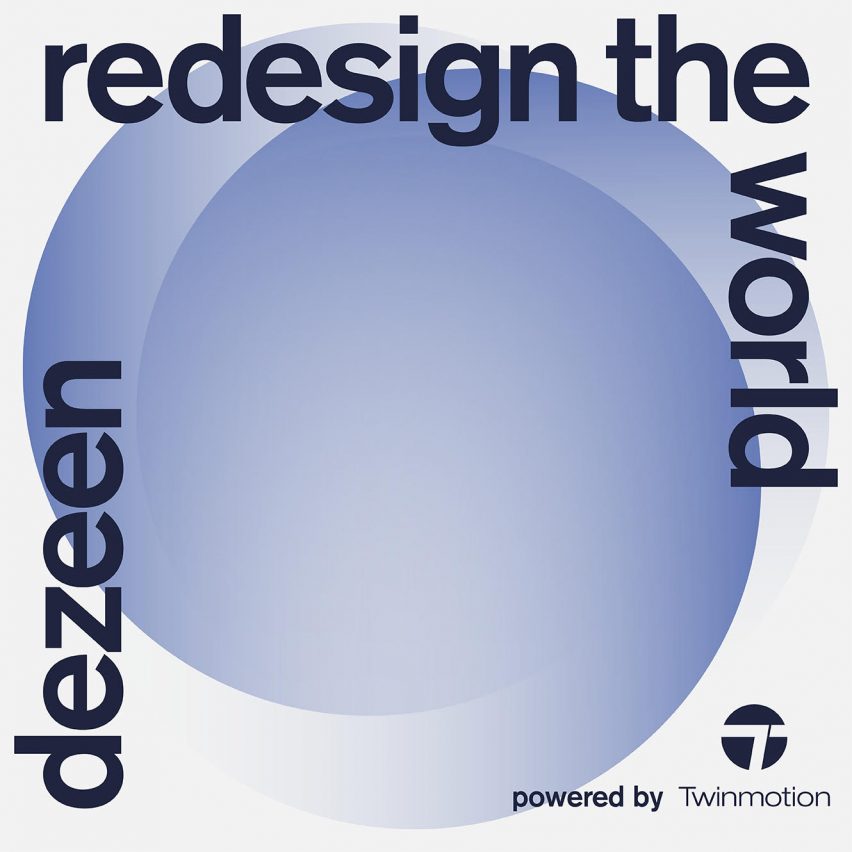Enzo Lara-Hamilton, Anne Wagner and Morgan Heenan imagine a world in which people live in "self-contained micro-habitats"
The next finalists in Dezeen's Redesign the World competition powered by Twinmotion are Enzo Lara-Hamilton, Anne Wagner and Morgan Heenan, who have proposed a world in which humans live in self-contained spherical pods.
Called Post-Ecology Pods, the proposal imagines humanity living in pods supplied by an organisation called the Intergovernmental Producer of Closed Climate Containers (IPCCC).
The pods, which are powered by solar energy, are described by the designers as "micro-environmental containers" that support human wellbeing.
The spherical pods are protected against the elements and protect the inhabitants from natural disasters. They are automated systems designed to reduce human labour by providing water, clean air and food.
Here agriculture is aeroponic, and CO2 is transformed into oxygen through "artificial carbon assimilation".
Although the pods are cramped, inhabitants have access to advanced virtual-reality systems, which enables them to connect with other humans in the metaverse.
Read more about the proposal below.

Post Ecology Pods
Enzo Lara-Hamilton, Anne Wagner and Morgan Heenan
Preston, Australia
Finalist
"For all of human history, the environment was created through complex interconnected ecosystems. However, in the 21st century, these systems have been under profound threat and undermined by destructive human activity.
"And as the climate tips further toward uninhabitability – biodiversity loss, decline of pollinators, climatic instability, soil erosion and the loss of microbial life – traditional ways of living will become increasingly obsolete. But never fear!
"The P-E.2100 project is a radical new paradigm for avoiding human extinction. We, the Intergovernmental Producer of Closed Climate Containers (IPCCC), are providing the global proliferation of self-contained micro-habitats.
"We are harnessing the power of technology to create cybernetic environments for human flourishing. Around the world, millions of P-E Pods!
"The P-E.2100 micro-globe transcends the threats of ecosystem collapse entirely by creating technologically self-regulating structures.
"The IPCCC is directed towards creating micro-environmental containers acutely tailored towards human wellbeing and the creation of a world far beyond the crude machinations of nature.
"The P-E.2100 is a radically streamlined system in which these needs are met with the greatest efficiency; that is, a minimum of non-human species.
"Techno-systems replace the antiquated need for reliance on ecosystem services for the provision of clean air, water, and food, and automated systems radically reduce the necessary amount of human labour.
"The container is a materially-closed system with solar radiation for energy being its only external input. Nutrient cycling is an automated process, which occurs primarily through technological systems.
"Aeroponic agriculture consists of modified, non-pollinated crops, redundant soil, insects, and even climatic stability as artificial lighting creates a consistent environment for growth.
"CO2 is reformulated into oxygen through artificial carbon assimilation, and biological waste is artificially decomposed to recycle nutrients into the food system.
"The sphere itself is fortified against the elements and is unaffected by environmental threats and natural disasters. It is elevated, stabilized, and its immense energy capture and storage capacity allow for extended periods without solar radiation.
"Due to the limited size capacity and the immense complexity of the techno-processes of the sphere, significant space is dedicated to these systems. However, the loss in physical space for its inhabitants is more than compensated for by the inclusion of virtual reality systems.
"This technology gives inhabitants access to pristine and beautiful worlds and allows for global connection between containers through hyperreal metaverse connectivity.
"The P-E.2100 project is a revolutionary paradigm for human life in the 21st century. No longer must civilization be trapped inside of, and forced to rely on, global webs of life.
"Within the sphere, prosperity is wholly human. It is by, and for, its inhabitants, and through its complex cybernetic systems of life, ascends above the outside world entirely."

Redesign the World
Redesign the World is the ultimate design competition, which called for new ideas to rethink planet Earth to ensure that it remains habitable long into the future.
Launched in partnership with Epic Games, the contest asked entrants to visualise their concepts using architectural visualisation software Twinmotion.
The contest received over 100 entries from more than 30 different countries around the world.
These were assessed by a judging panel comprising White Arkitekter CEO Alexandra Hagen, structural engineer Hanif Kara, speculative architect Liam Young, Twinmotion product marketing manager Belinda Ercan and Dezeen founder and editor-in-chief Marcus Fairs, which selected 15 proposals as finalists to be published on Dezeen.
We are unveiling one finalist a day throughout our Dezeen 15 festival, culminating in the winner being announced on 19 November.
The winner will receive the top prize of £5,000. There are also prizes of £2,500 for second place, £1,000 for third place and £500 each for the remaining finalists.
Find out more about Redesign the World ›
See all the finalists revealed so far ›